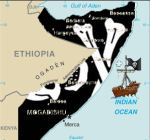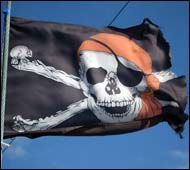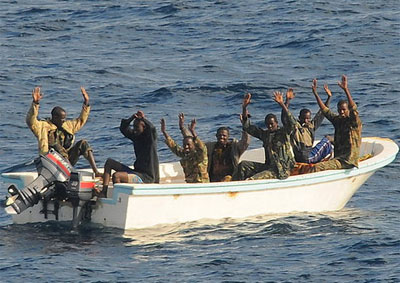 A report originating from Reuters states that United Nations officials are alleging that ransom payments made to Somali pirates are going, at least in part, to Somali militants, raising the possibility that shipping groups and insurance companies making these payments might be breaching economic sanctions targeting Somalian militants. The report went on to say that in February the Somali militant group al-Shabaab had seized a number of pirate leaders and forced them to agree to pay 20 percent of all future ransoms to al-Shabaab. Reuters then cited its own investigations showing these instances in which ransoms were diverted to the militant group:
A report originating from Reuters states that United Nations officials are alleging that ransom payments made to Somali pirates are going, at least in part, to Somali militants, raising the possibility that shipping groups and insurance companies making these payments might be breaching economic sanctions targeting Somalian militants. The report went on to say that in February the Somali militant group al-Shabaab had seized a number of pirate leaders and forced them to agree to pay 20 percent of all future ransoms to al-Shabaab. Reuters then cited its own investigations showing these instances in which ransoms were diverted to the militant group:
• Feb. 25: $200,000 from the release of the Japanese-owned MV Izumi after pirates received a $4.5 million ransom.
• March 8: $80,000 from the $2 million release of the St. Vincent & Grenadines-flagged MV Rak Africana.
• March 9: $100,000 after the Singapore-flagged MV York was freed for $4.5 million.
• April 13: $600,000 from the release of the German ship Beluga Nomination after a $5.5 million ransom was paid.
• April 15: A $66,000 share of the $3.6 million ransom handed over for the Panama-flagged MV Asphalt Venture.
• May 14: $100,000 from the release of two Spanish crew of the Spanish-owned FV VEGA 5.
According to Reuters, the payment of these amounts was “corroborated” by pirates, al-Shabaab and Somali residents.
Al-Shabaab is listed on the Treasury Department’s List of Specially Designated Nationals and Blocked Persons, but payments made by shipping and insurance companies to pirates that wound up in the hands of the group would not violate Treasury regulations unless the payments were made knowing that they would wind up in the hands of al-Shabaab. Al-Shabaab is also listed by the State Department as a Foreign Terrorist Organization. Because of that designation, 18 U.S.C. § 2339A prohibits the provision of money to al-Shabaab “knowing or intending” that the money be used for the commission of certain terrorist crimes enumerated in the statute. It seems hard to argue, even given the alleged 20% take agreement, that payment of ransom to the pirates satisfies the standards of that statute.
In an earlier post on Somali piracy, I noted that OFAC agreed that its rules only forbid payment to individual pirates and pirate groups that had been designated but recommended that, nonetheless, ship owners and insurance companies consult with OFAC before making ransom payments to Somali pirates. The Reuters story suggests that some companies have been consulting with OFAC prior to ransom payments even though that is not legally required:
Michael Frodl, a Washington lawyer and head of C-level Maritime Risks, … said the U.S. Treasury’s Office of Foreign Assets Control (OFAC) carried out reviews of all potential ransom payments to determine if the pirate group in question had ever handed over part of a ransom to al-Shabaab.
“Most times OFAC has authorized payment because it has found no link,” Mr. Frodl said. “But if there is indeed a 20% ‘tax’ being applied by Shabaab against pirate ransoms in Haradhere, a major pirate hub it now controls, then things could change.”
Yes, things “could” change, but only the 20 percent tax is actually occuring and the person making the payment was aware of it. Even then, where the payment is not going directly to al-Shabaab and is necessary to end an imminent threat to the life and safety of crew members, OFAC may be in a difficult position arguing that the payment to the non-designated pirates is a violation of its rules.
UPDATE: As commenter Josh points out, al-Shabaab is on the SDN list. In my original post, I was unable to find them. My guess is that there was a typo in my search request. The post has been updated to reflect the designation of al-Shabaab as an SDN
 The normally perspicacious Spencer Ackerman of the Danger Room at Wired, posted a story on a British start-up that promises a private navy to protect commercial shipping from pirates (for a jolly fee, of course). However, Ackerman ignores the 800 pound parrot on the pirate’s shoulder: namely, laws restricting the import and export of arms.
The normally perspicacious Spencer Ackerman of the Danger Room at Wired, posted a story on a British start-up that promises a private navy to protect commercial shipping from pirates (for a jolly fee, of course). However, Ackerman ignores the 800 pound parrot on the pirate’s shoulder: namely, laws restricting the import and export of arms.
 Posted by
Posted by  Category:
Category: 


 A
A  Earlier this week Philip Shapiro, the CEO of Liberty Maritime,
Earlier this week Philip Shapiro, the CEO of Liberty Maritime, 

